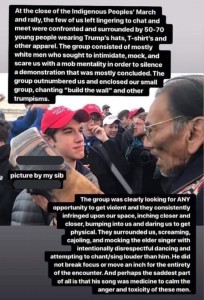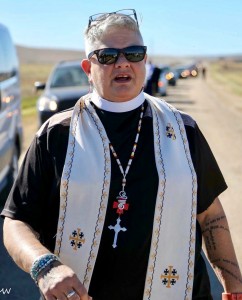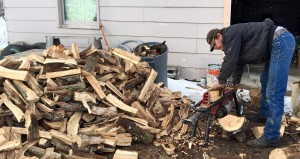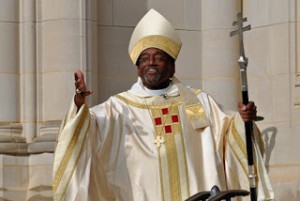3 LentC: Who knew we needed so much manure in our lives?!
2 LentC: Love, even in the darkness
1LentC 2019: A Lenten Challenge: Be Kind. Every Day.
3 Epiphany C: Pay it forward, forever and ever …
2 Epiphany C: “What concern is that to you or to me?”
A sermon on John 2:1-11, the Wedding at Cana, and Jesus’ question to his mother (and to us): “What concern is that to you or to me?” – in the context of the high school students harassing and mocking a Native elder in Washington, D.C.
[A quick note on this: I misspoke – the incident took place at the Lincoln Memorial, not Arlington National Cemetery. I have corrected that in the written copy below.]
A sermon preached on John 2:1-11
The Second Sunday after the Epiphany
Rosebud Episcopal Mission, Rosebud Reservation
20 January 2019
The Rev. Dr. Lauren R. Stanley
This morning, I wanted to preach on the wedding in Cana, from the Gospel of John.
Specifically, I wanted to preach about a joyful Jesus, a laughing Jesus, a dancing Jesus.
I wanted to preach about how God created us in love and joy so that we could live in love and joy.
I wanted to help us get beyond the image so many people have that God is vengeful and life is supposed to be about suffering, and I wanted to preach about how important it is for us to remember that we are created in love, and love tends to be on the joyful end of the scale of life, and how, in our very creation, God invites us to participate in that love and joy.
And I wanted to explain why Jewish weddings in those day lasted for three days – three days! Can you imagine the expense of a wedding over three days?! – and then compare those weddings to wacipis, to powwows, that now are three or four days but in years gone by lasted much longer – and then to explain that both weddings and wacipis had a similar function: They were there for friends and families who do not get to see each other as much as they want to, to come together, not just to celebrate the event, but to catch up. “Bunny! I haven’t seen you in a year! How are you doing?”
(And I wanted to share with you what was shared with me not long after I arrived here on the Rosebud, that in the midst of the family reunion that is a wacipi, young men and women look with hope for their spouse-to-be, and how, when a young man or a young woman meets someone in whom they are interested, they went to their grandmothers, who in turn gathers all the grandmothers and aunties to figure out the family lineage, and whether the two young people could even date. As I tell our visiting mission teams, if your grandmother says, “No!” it means “Absolutely not! You cannot date your cousins!” And if your grandmother says, “Yes,” well, then …)
But instead, something happened on Friday in Washington, D.C., something which did not become public until yesterday, and suddenly, instead of talking about a joyful Jesus – a Jesus who laughed and danced and yes, turned water into wine to demonstrate the abundance of God’s love – preaching about that didn’t seem right.
On Friday, there were two mass marches in Washington.
The first, in the morning, was the Indigenous Peoples’ Day March, which drew thousands of Natives from across this land (and, I suspect, from around the world). The message of that march? We are still here. We matter. And we’re not going away.
The second march was the annual March for Life, the pro-life, anti-abortion march that also drew thousands of participants.
 At the end of the first march, the Indigenous Peoples’ Day March, an elder of the Omaha tribe, a man named Nathan Phillips, who is a musician, and educator, a pipe-carrier and a decorated Vietnam Veteran, was surrounded by high school students from a Catholic high school near Covington, Kentucky, and was harassed and mocked.
At the end of the first march, the Indigenous Peoples’ Day March, an elder of the Omaha tribe, a man named Nathan Phillips, who is a musician, and educator, a pipe-carrier and a decorated Vietnam Veteran, was surrounded by high school students from a Catholic high school near Covington, Kentucky, and was harassed and mocked.
Nathan Phillips is a respected elder who is a long-time Native youth group leader and he is a water protector. He was at Standing Rock.
The students who surrounded and mocked him were in Washington for the March for Life. While Nathan Phillips was singing a song – at Arlington National Cemetery [Note: This actually took place at the Lincoln Memorial, a fact I regret getting wrong.] – honoring Native American Veterans who lost their lives in Southeast Asia, these students, many of whom were wearing “Make America Great Again” hats and shirts, they shouted things at him like “Build the wall!” (more on that in a moment), and “Gone in 2020.” They mockingly “danced” as Mr. Phillips sang and drummed, and one student stood directly in front of Mr. Phillips, smirking as he stared at this Native elder.
As you can imagine, rage erupted at these thoughtless and seemingly hate-filled youths doing this to a Native elder.
And to be frank, there was a lot of bemusement, because, after all, why would you say “Build the wall” to a Native?
When I saw the news, via Facebook, I had to take a few minutes to calm down. I was so enraged. Yet I was glad I was not present for this, because I don’t know what I would have done. After calming down, I wanted to share what had happened because what these children did is wrong, and we must never be silent in face of injustice.
So after calming down, I posted a picture of what happened and wrote:
To the children who taunted this elder and chanted “Build the wall!”: You DO realize that if the wall had existed hundreds of years ago, your ancestors wouldn’t have been able to come to this country, and only Natives would be here … right? That if Natives had built a wall, YOU wouldn’t be here?! Your actions are despicable … and now that you are on video, you will be found, and taunted in return for such extreme rudeness and ignorance. Listen, I need you to pay attention in school – because obviously, right now, you are totally unemployable due to basic ignorance. And I need you to be employed so YOU can put into Social Security for my retirement.
I wanted to point out the incongruity of what they did, as well as publicize their terrible behavior, without getting into vitriolic denigration of these children. Because, my friends, that’s what everyone else was doing.
The Rev. Laura Minnich Lockey, whom many of you know, she leads a mission team here every summer from Emmanuel Episcopal Church in Harrisonburg, Virginia – she’s the one who loves to ride the riding mower, and will spend every day she’s here mowing anything she can get hands on – she responded to my post by writing, Maybe some young men need to spend their summer in SD with Mother Lauren.
I wrote back and said, Hey, that’s not a bad idea, and I thought about it for a while, and then I wrote a letter to the Principal of Covington Catholic High School, in which I invited these very students to come to the Rosebud Reservation, as guests of the Rosebud Episcopal Mission, so that they could learn about Lakota culture and tradition. I invited them to participate in a talking circle with elders – and promised that that was not a time for intimidation and retribution, but rather a way for the elders to love the children and correct their ways. I invited them to meet with our teen-agers, their peers of the same age and in the same grade, to learn what life is like as a Native teen in this country. I told the principal we could house their students (at the Jones Building and Barbour Hall), and that while we are poor, we would be willing to waive the $15 per person/per night fee, if necessary, in order to make this trip happen.
And I closed by saying this:
I pray that you will see my offer to your students as one of grace, reconciliation, redemption and love.
I have e-mailed the letter to the principal, and on Tuesday will mail a paper copy to him, along with copies to the bishop of the Catholic Diocese of Covington, and the Superintendent and Assistant Superintendent of the Diocesan Board of Catholic Education.
I did this because I believe that the mission of the Church is reconciliation. Because I believe that there has to be and is a way to redeem this awful act. Because I know that these children are not beyond the grace and love of God.
And I did it because I believe that this is what Jesus would do.
All of this, my friends, is a very long way of getting to this morning’s Gospel, the one about the wedding in Cana, where Jesus makes a comment to his mother that is, I believe, key to how we respond to acts of hate.
When Jesus’ mother tells him there is no more wine for the celebration, he replies, “Woman, what concern is that to you and to me?”
It was my friend, Father Matt Rhodes, who is vicar of Christ Church in Millwood, Virginia, who pointed this out, with eloquent words late last night:
“Among everything else,” he writes, “that makes this creation so beautiful and the human family of which we are all part so magnificent, there is much that is problematic. There are issues of division … of hatred … of discontent. Differences that might otherwise be embraced are trampled upon. We see instances when people who are suffering are ignored … when people who are belittled find no support … when people who are lost are left to wander.”
He continues, “It is easy to pin these and many other responses on differences of ideology, or politics. I refuse to do so. The knife of indifference cuts in many directions and slices through any spectrum. No, I pin this on the refusal of some to seriously consider the question that Jesus asked Mary and what is still being asked of us this morning: ‘What concern is that to you and to me?’”
When I read Matt’s preview of his sermon that he is preaching today in Virginia, I knew that I could no longer focus on laughing, dancing, joyful Jesus, much as I wanted to. I knew that today, I had address that which concerns us — standing up to injustice and ignorance and hatred.
Dietrich Bonhoeffer, the German theologian who was hanged by the Nazis in World War II because of his participation in an assassination attempt on Adolf Hitler, was very clear in his belief that when we see injustice, when we witness hatred, when we hear ignorance, we cannot ignore it.
Silence in the face of evil, he wrote, is itself evil: God will not hold us guiltless. Not to speak is to speak. Not to act is to act.
But know this: Our speaking up needs to emulate Jesus. We need not to lash out, to call those children bad names, to attack the school or the Diocese of Covington. We do not need to repay evil with evil. I can tell you, having read scores of comments from people all over this country, that is how many people are responding.
But we are followers of Jesus.
And the Jesus I wanted to talk about today – the laughing, dancing, joyful Jesus who showers us with an abundance of joy and love – would not respond to evil with more evil, to hatred with more hatred, or to vitriol with more vitriol.
Jesus would have found a way to love these children.
I am praying that in my offer to the students of Covington Catholic High School in Kentucky, we are doing the same.
Admittedly, there are some who believe that this offer is not the right thing to do, that Natives should not have to educate non-Natives. And I get it. And there are some who believe that the invitation should have come from the Tribal Council, and not the Church – which I admit I do not quite understand.
But as followers of Jesus, we are the ones charged with reconciliation. We are the ones who are called to act first out of love. We are the ones who in our baptismal covenant vowed to respect the dignity of every human being.
I believe this is our chance to live into that covenant in a bold and loving way – as bold as Jesus turning 180 gallons of water into wine for guests at a three-day wedding in Cana.
I do not know if the principal of that school will ever receive the invitation — within hours, their website was crashed, their phone was overwhelmed, and the e-mail could no longer accept any information. Or, if he does, will ever read it, much less respond to it.
But if he reads it, and if he accepts it, we have a chance – with these children – to shower them with love instead of hate, with joy instead of mockery. We have a chance to live into both the woLakota way of life and our baptismal covenant.
We have a chance, if they come here, to shower them with the same love and joy that Jesus showers upon us.
We can even teach them to dance.
And wouldn’t that make a big difference in this world?
Amen.
Postscript:
I want to take a moment before we reaffirm our faith to let you know that I have spoken with Erroll (Geboe), our Vice Itancan, and Wilma (Janis), our Itancan, and it will go to the Mission Council this week, and for the most part, there is great support on this.
I do agree that Natives should not have to educate non-Natives. It should not be your responsibility. But I also believe that we could really make a difference if we actually did educate these children, and bring them out here, not as a mission team to work – although we may make them split some wood (exercise is always good for children) – but to show them, and teach them, so that never again will they do this. Their act was terrible, and I fear that if I had been there, I would not have been very loving. So this is the response … because if the Church doesn’t do this, who will? This is what I believe we are called to.
And if it happens, I want to assure you, yes, we will waive the fee for them, and I already have almost two dozen offers from people around the country who will pay the fee on their behalf, so that the Council, the Mission, does have money to do this.
If you want to talk about this some more, we will talk after the service.
Amen.
What do we need to give up?
Of Law & Order, Power & Authority, And The Jesus Movement
This is God in action
It is a cold Sunday morning here on the Rosebud, this Second Sunday after the Epiphany. At 6 a.m., the temperature with the wind chill – and we know wind chill here on the Great Plains – was nearly 30 below zero.
It is so cold that we canceled most of our church services on the Western side of the Rosebud Episcopal Mission. I don’t want our people out in weather that literally can kill you in less than 30 minutes.
But even when we don’t have church services, God is still at work in our lives. 
A few minutes ago, a car pulled into my driveway. If we had had church, I wouldn’t be here at this time, and most of the people know that. But since my car was still parked, still covered in a light dusting of snow, whoever was in that visiting vehicle knew that I most likely was home.
After a few moments of hesitation, the driver got out. She didn’t have a hat. Or gloves. She was holding her way-too-light winter jacket closed with one hand. “You need to zip that up,” I said. “Oh, it doesn’t zip,” she said. “It’s broken.”
I know this woman. She is one of our parishioners here on the Rosebud, a woman who has struggled to hold things together, a woman with children and grandchildren, one of whom has a several physical handicap. This woman needs help, but she hesitates to ask. She doesn’t want to be a burden. Whenever I am with her, I always let her take the lead, because I know how hard it is for her to ask for anything.
“Didn’t we have church this morning?” she asked. “No,” I told her. “We canceled church because of the cold.”
“Um … does the church have any help?” she asked, hesitating every other word.
It turns out they have no food to eat in the house. I’m not surprised. It is mid-month, and it is very cold, and many people do not have enough money for both heat and food.
So I take her into my kitchen, which she does not want to enter because she might track snow onto my linoleum floor. “I don’t care about the floor,” I told her. “It can be washed. Come inside. It’s too cold to stand out there.”
Finally, she enters. I have to encourage her to take more than one step into the kitchen.
“Do you have any food, like bread?” she asks, her head down. I know that she doesn’t want to do this, but she has children. They must eat.
“I don’t have any bread,” I tell her, “because I generally don’t eat bread. But here … I have other food for you.”
I take out four cans of soup, 10 cans of tuna, pasta, couscous, cans of pears and apricots. I give her half of my grapes, most of my bananas, most of my oranges. “Here,” I say, “these have to be eaten. Help me with this.” I see two bags of popcorn someone had given me, as well as some crackers. (“Oh,” she says, “we have crackers.” “Take them,” I say. “You might as well have some more.”) The  large canister of oatmeal has been opened, but I give it to her anyway. It’s mostly full, and the kids will like it. I scour the cabinets for more food her family will eat. “Have you tried quinoa?” I ask. “No. What is it?” she replies. “It’s one of those healthy grains. Easy to make. Just follow the instructions. I like it,” I tell her. In the bags it goes.
large canister of oatmeal has been opened, but I give it to her anyway. It’s mostly full, and the kids will like it. I scour the cabinets for more food her family will eat. “Have you tried quinoa?” I ask. “No. What is it?” she replies. “It’s one of those healthy grains. Easy to make. Just follow the instructions. I like it,” I tell her. In the bags it goes.
Much of the food I give is food I have purchased for just this occasion. People come to my door, sometimes one or two a day, looking for help. I try to keep food on hand that I know they will eat. Cans of fruit, vegetables, soups. Bags of pasta. Boxes of couscous and quinoa. When I have fruit on hand, I always share it with them. I ask them to help me eat it before it goes bad. Our people don’t get enough fruit; it’s frequently too expensive. I try to make sure I always have some on hand for my visitors.
But I have to be careful not to give too much, not to give all that I have. This is a shared meal, as it were, which means that I have to have some food left for myself. The goal is to make sure that everyone has enough. Just that: Enough.
Through it all, my two dogs, Yassa and Bella, are standing there to greet her. She hesitatingly reaches out for them. My dogs are trained to be church dogs, meaning that they are polite and don’t jump, that they greet each person with love. “They’re so soft,” she says, over and over again. “I can’t believe how soft their fur is.” I tell her it is the dog food, keeps them healthy, the same dog food the vet uses. She marvels again at their softness, and their gentleness. “They’re so nice,” she says, stroking Yassa’s fur. (Meanwhile, Bella, who emerged from her blankets, stands shivering. My visitor is concerned: “She’s cold!” I tell her than Bella lives under her blankets in the winter, and that she always shivers when around guests. Bella is a little … well, manipulative that way. She wants every visitor to pick her up and cuddle her. In return, she loves to give kisses. It’s just Bella’s way …) I do not tell my visitor how much the dog food costs; I am too embarrassed to admit I have that kind of money to feed dogs …
As she turns to take the food out to the waiting car, where her daughter and granddaughter are waiting, I ask if they can use some coats. My family and I picked up a lot of them for a giveaway that I am having problems getting organized (it’s complicated, but it will happen).
We go to the front porch and find a new jacket for the woman, one that is warm and will zip up. Then we find one for her smallest child. Then we dig through and get hats and scarves and gloves. “Take what you need,” I say. “It’s for you.” She is hesitant, again. She does not want to take too much, but I know there is a need. “Really,” I say, encouraging her. “Don’t you want some of these scarves? They are hand-made.”
Finally, my visitor takes some of the softest scarves she can find. “If it’s all right …” “Take as many as you need,” I say. “Wouldn’t you like another one? They’re handmade for the oyate (the Lakota people).” “Just one more,” she says. “They’re so soft …”
I peek out the window and see the children in the car already consuming the fruit, smiling as they eat it. Already, this has been a good visit.
Again, we go to the door. I know that she feels she has taken too much.
“Do you have a wood stove?” I ask. “I have wood if you need it.”
Once more, hesitation.
Finally, I get her to agree to take what I have stored in my “secret stash.” (We cut wood for the people here on the Rosebud in our Firewood for the Elders program. While I was away after Christmas, nearly all of it was taken by a few folks who have lost their way when it comes to taking care of all the oyate. But we are cutting more wood, with the help of the community. To learn more about that, see our new website, rosebudepiscopalmission.org, and look under “Our Blog.”)
She and her daughter take the wood that is left, enough to keep them warm at least for another day.
Our new Presiding Bishop, The Most Rev. Michael Curry, has proclaimed that we are part of the Jesus Movement. That we are the ones who are called to live out the Gospel of love and inclusion every single day of our lives. That we are the ones who can change the world by our words and deeds.
No, we didn’t have church this morning on the Rosebud West. It was too cold.
Instead, we – a visitor and myself, as well as my two dogs – had church in my kitchen. Where we broke bread together by sharing our food. And on my front porch. Where we shared from the abundance of cold-weather gear.
This is the Jesus Movement. This is God in action.
Our collect for today, the Second Sunday after the Epiphany:
Almighty God, whose Son our Savior Jesus Christ is the light of the world: Grant that your people, illumined by your Word and Sacraments, may shine with the radiance of Christ’s glory, that he may be known, worshiped, and obeyed to the ends of the earth; through Jesus Christ our Lord, who with you and the Holy Spirit lives and reigns, one God, now and for ever. Amen.









